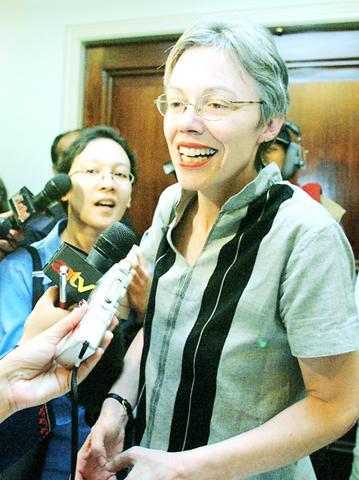An American researcher whose work helped expose a network of al-Qaeda-linked terrorists in Indonesia has been ordered out of the country for violating her work permit, an immigration official said yesterday.
However, terrorism expert Sidney Jones claimed that Indonesia's intelligence agency was behind the expulsion order because it considered reports published by her group, International Crisis Group (ICG), to be "subversive."
The order represents a blow to freedom of expression in Indonesia, which critics say has been gradually eroded since democratic reforms were ushered in after the downfall of ex-dictator Suharto in 1998.

PHOTO: REUTERS
The government has jailed several student activists and journalists critical of President Megawati Sukarnoputri -- currently seeking re-election -- and other political leaders.
Jones, 52, from Albany, New York, said she was given the deportation order late on Tuesday. It cited immigration violations and was effective immediately.
Her Australian assistant analyst, Francesca Lawe-Davies, 27, was also ordered to leave.
Indonesia's immigration department spokesman Ade Endang Dahlan confirmed the order yesterday, saying Jones had violated the terms of her work permit, but he gave no more details.
Earlier, authorities had said they might not renew Jones' visa, which expires on June 10. It was unclear why the government stepped up its action against her on Tuesday.
"I was devastated to learn that I had to leave Indonesia, but now I am just furious," she said. "I am not sure when I have to leave. I am assuming they'll give [me] time to pack."'
The Belgium-based think tank opened its office in Jakarta in 2000.
In 2002, the group released detailed reports on the activities of the al-Qaeda linked Jemaah Islamiyah terror group in Indonesia at a time when the government refused to acknowledge its existence.
Jemaah Islamiyah was blamed for the Oct. 12, 2002, Bali bombings. Police have since arrested scores of its members.
ICG has also produced critical reports on the government response to separatist conflicts in Aceh and Papua provinces as well as religious violence in Central Sulawesi.
Some officials and diplomats have privately complained that the terrorism reports were alarmist and were so often cited in the Western media that they hurt the country's economy, particularly its tourism sector.
The ICG's president, former Australian foreign minister Gareth Evans, said the expulsion order was served with "a desire to smother legitimate criticism."
"This will do far more damage to Indonesia's reputation than [to] the ICG's," he said. "This is a sad day for those hoping for better from Indonesian democracy."
Foreigners have largely been immune to Megawati's crackdown on critics, although a court jailed British national Lesley Jane McCulloch, an academic critical of the government, for five months after she was caught in Aceh in 2002.
Megawati is currently trailing her main rival in opinion polls ahead of presidential elections scheduled for July 5.

Indonesia yesterday began enforcing its newly ratified penal code, replacing a Dutch-era criminal law that had governed the country for more than 80 years and marking a major shift in its legal landscape. Since proclaiming independence in 1945, the Southeast Asian country had continued to operate under a colonial framework widely criticized as outdated and misaligned with Indonesia’s social values. Efforts to revise the code stalled for decades as lawmakers debated how to balance human rights, religious norms and local traditions in the world’s most populous Muslim-majority nation. The 345-page Indonesian Penal Code, known as the KUHP, was passed in 2022. It

‘DISRESPECTFUL’: Katie Miller, the wife of Trump’s most influential adviser, drew ire by posting an image of Greenland in the colors of the US flag, captioning it ‘SOON’ US President Donald Trump on Sunday doubled down on his claim that Greenland should become part of the US, despite calls by the Danish prime minister to stop “threatening” the territory. Washington’s military intervention in Venezuela has reignited fears for Greenland, which Trump has repeatedly said he wants to annex, given its strategic location in the arctic. While aboard Air Force One en route to Washington, Trump reiterated the goal. “We need Greenland from the standpoint of national security, and Denmark is not going to be able to do it,” he said in response to a reporter’s question. “We’ll worry about Greenland in

PERILOUS JOURNEY: Over just a matter of days last month, about 1,600 Afghans who were at risk of perishing due to the cold weather were rescued in the mountains Habibullah set off from his home in western Afghanistan determined to find work in Iran, only for the 15-year-old to freeze to death while walking across the mountainous frontier. “He was forced to go, to bring food for the family,” his mother, Mah Jan, said at her mud home in Ghunjan village. “We have no food to eat, we have no clothes to wear. The house in which I live has no electricity, no water. I have no proper window, nothing to burn for heating,” she added, clutching a photograph of her son. Habibullah was one of at least 18 migrants who died

Russia early yesterday bombarded Ukraine, killing two people in the Kyiv region, authorities said on the eve of a diplomatic summit in France. A nationwide siren was issued just after midnight, while Ukraine’s military said air defenses were operating in several places. In the capital, a private medical facility caught fire as a result of the Russian strikes, killing one person and wounding three others, the State Emergency Service of Kyiv said. It released images of rescuers removing people on stretchers from a gutted building. Another pre-dawn attack on the neighboring city of Fastiv killed one man in his 70s, Kyiv Governor Mykola